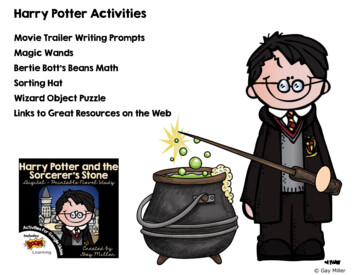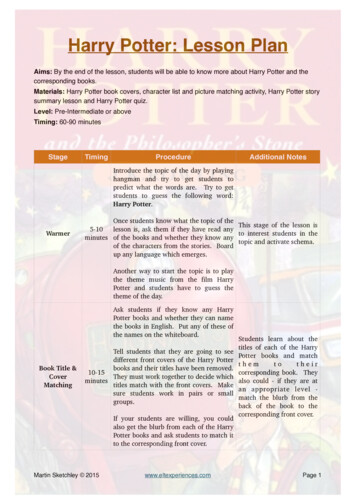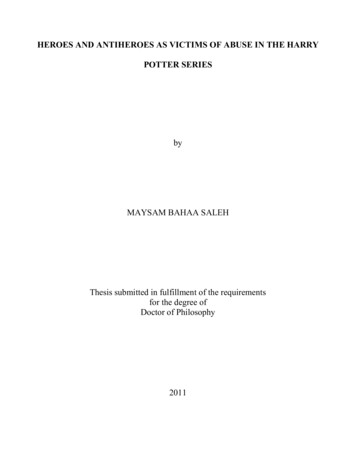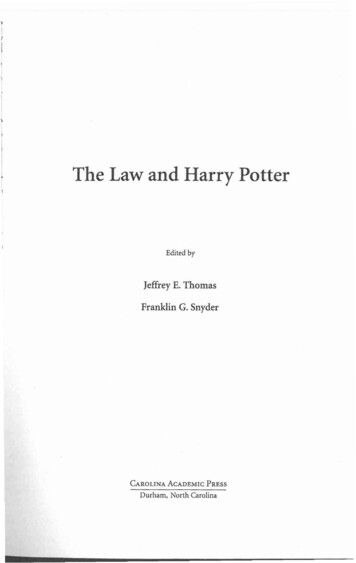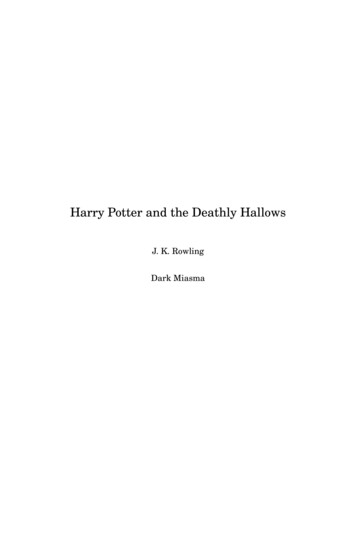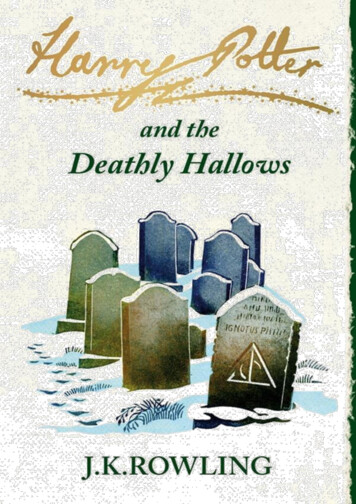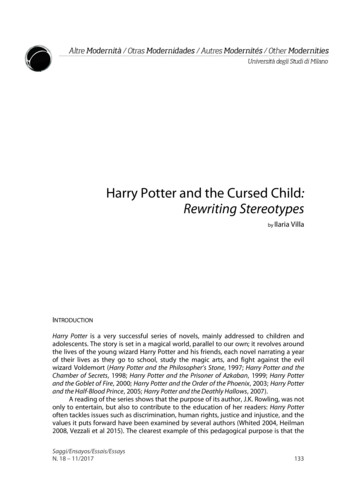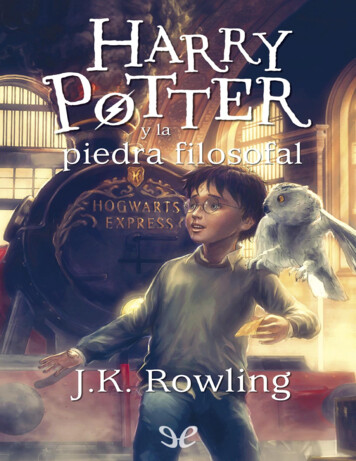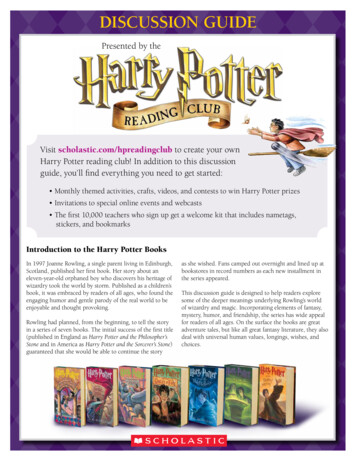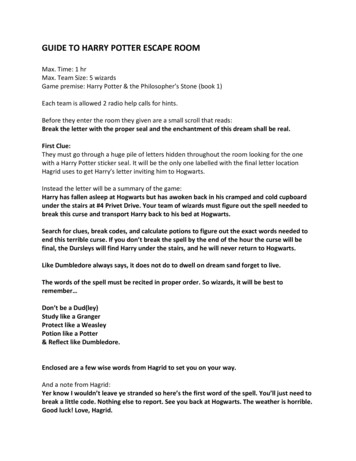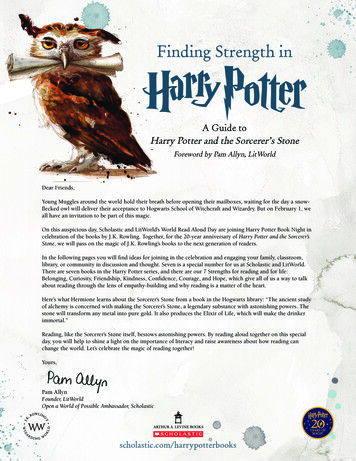
Transcription
Finding Strength inA Guide toHarry Potter and the Sorcerer’s StoneForeword by Pam Allyn, LitWorldDear Friends,Young Muggles around the world hold their breath before opening their mailboxes, waiting for the day a snowflecked owl will deliver their acceptance to Hogwarts School of Witchcraft and Wizardry. But on February 1, weall have an invitation to be part of this magic.On this auspicious day, Scholastic and LitWorld’s World Read Aloud Day are joining Harry Potter Book Night incelebration of the books by J.K. Rowling. Together, for the 20-year anniversary of Harry Potter and the Sorcerer’sStone, we will pass on the magic of J.K. Rowling’s books to the next generation of readers.In the following pages you will find ideas for joining in the celebration and engaging your family, classroom,library, or community in discussion and thought. Seven is a special number for us at Scholastic and LitWorld.There are seven books in the Harry Potter series, and there are our 7 Strengths for reading and for life:Belonging, Curiosity, Friendship, Kindness, Confidence, Courage, and Hope, which give all of us a way to talkabout reading through the lens of empathy-building and why reading is a matter of the heart.Here’s what Hermione learns about the Sorcerer’s Stone from a book in the Hogwarts library: “The ancient studyof alchemy is concerned with making the Sorcerer’s Stone, a legendary substance with astonishing powers. Thestone will transform any metal into pure gold. It also produces the Elixir of Life, which will make the drinkerimmortal.”Reading, like the Sorcerer’s Stone itself, bestows astonishing powers. By reading aloud together on this specialday, you will help to shine a light on the importance of literacy and raise awareness about how reading canchange the world. Let’s celebrate the magic of reading together!Yours,Pam AllynFounder, LitWorldOpen a World of Possible Ambassador, Scholasticscholastic.com/harrypotterbooks
BELONGINGFeeling needed, loved, and respected inyour family, community, and in the worldas a whole.Feeling DifferentWhen Harry Potter and the Sorcerer’s Stone begins,the reader gets a vivid picture of where Harrydoesn’t belong: number four, Privet Drive. Wesee immediately that Harry doesn’t fit in with theDursleys; despite being a member of the family,his aunt, uncle, and cousin treat Harry horribly.In chapter two, look at how Harry is treatedthroughout breakfast and through the beginning ofthe day. What are the ways the Dursleys make Harryfeel unwelcome, ignored, and discouraged? Readaloud some examplesfrom the book.Hope and ResilienceHarry makes the best ofhis circumstances, but heclearly wishes he couldfind a friend. What arethe signs in chapter two,at the zoo, that show youHarry is looking for aplace to belong? Wherehas Harry found refugewith any people, places,or activities in the Muggleworld? How does he showhe hasn’t lost hope offinding people who acceptand love him?Finding Your PlaceWhen Harry learns of hisplace in the wizardingworld, he discovers a whole new world in which heis not only accepted but celebrated. Read Hagrid’srevelation to Harry in chapter four. When Hagridtells Harry of his heritage, how does that affectHarry? When he and Hagrid visit Diagon Alley, whatinteractions show that Harry has found a welcomingcommunity?Building CommunityHogwarts is a large school with many types ofstudents, including witches and wizards from allbackgrounds, as well as creatures like centaursand ghosts. How do students build communitythrough the way they study and play together? Howdoes the House system encourage camaraderie?Does competing for House points divide or unitestudents?RespectRespect is a key part of making sure a communitysticks together despite differences. How do theprofessors at Hogwarts demonstrate respect foreach other? For their students? Can you pinpointa moment when a professor treats a student betterthan expected? Worse?What’s Your House?Hogwarts Houses arenot randomly assignedbut are chosen magicallyin keeping with eachstudent’s character andwishes. How do theHouses build a senseof community? ReadNeville’s confrontationwith Draco in chapterthirteen. What happenswhen a student doesn’tquite feel at home in theirHouse? How do theirfellows help them feelthey belong? Do you havea strong sense of whichHogwarts House youwould be placed in? Whydo you feel you belong inthat House?Feeling at HomeWhen do you think Harry’s feeling of belonging isstrongest? How about for Hermione? Ron? Neville?Draco? Looking at the whole book, pick a momentwhen you think each character truly felt like theybelonged at Hogwarts and read it aloud.
CURIOSITYFostering a willingness to explore newterritory and test new theories.Exploring New WorldsHarry is curious by nature, and he finds fellowexplorers in Ron Weasley and Hermione Granger.Of the three friends, who would you say is themost driven by curiosity? What makes you pickthat character? Read aloud excerpts from the text tosupport your reasons.Asking QuestionsIn chapters eleven and twelve, Hagrid doeseverything he can to discourage the students fromfurther investigations about the out-of-boundscorridor on the third floor. This doesn’t stop themfrom using every resource they have to find outmore details. Explain why something that’s off-limitsmight be more interesting or appealing. Is therea good reason to stop asking questions? What aresome other ways you can find out answers besidesasking questions? After Harry, Ron, and Hermionediscover Fluffy and hear about Nicolas Flamel, whatare some ways they try to get answers? Find anexcerpt from the text and read it out loud.Curiouser and CuriouserDo you think the characters show different kinds ofcuriosity? Who would you say wants to figure thingsout by conducting an experiment? Who wants tolearn more about the world through research andreading? What are the benefits of both ways offinding out answers? What do you prefer: testingtheories or diving into a book?Bending RulesBeing curious can also lead to risk. Hogwarts as aschool encourages students to experiment in class,but also has a lot of rules and restrictions aboutwhat, when, and where students can explore. Whatrules make sense to you? Which events in the storymight never have happened if the characters weren’tcurious enough to bend rules? Do you remembertimes in the book when professors bend the rules too?
FRIENDSHIPHaving close, trusting relationships withothers.Friends for All OccasionsPeople count on different friends for differentinterests and needs. Ron is devoted to Quidditchwhile Hermione loves a day of learning in thelibrary. What does Harry depend on Ron for in theirfriendship? What does he depend on Hermione for?What do each of them look to Harry for help with?List some of the interests and activities of charactersin the book. Is there any overlap?Making FriendsIn chapter six, Harry gets settled aboard theHogwarts Express and has interactions with manyother students. How does he decide who to befriendand who to be wary of on the train? Are there anyclues in this chapter about what will make Ron andHermione good friends for Harry? Find a passagefrom the book and read it aloud.Unexpected AlliesWhen readers recall Harry Potter’s adventures, ourthree main characters, Harry, Ron, and Hermione,are the first people many remember. Harry andRon became friends within hours of meeting, but ittakes a long time for Hermione to become a trustedfriend. In chapter ten, Ron declares that Hermioneis “a nightmare” and says, “She must’ve noticedshe’s got no friends.” Harry shows concern thatHermione overhears Ron and is in tears, but Ronis not too bothered. How does the adventure withthe troll change how Harry and Ron see Hermione?After this, what do Harry and Ron each value aboutHermione—and how does that compare to how theythought about her before this incident?TrustFriendship is built on trust. How do the characters,both students and adults, show they trust each otherin this first adventure? Find a passage where you cansee one character showing another character thatthey trust them and read it out loud.
KINDNESSBeing tender toward others in the worldwho are in need, both near and far.Words and DeedsMany people grow to understand how to behavefrom the adults and older mentors around them.How do the different professors at Hogwartsshow kindness toward the students in their care?Which adults in the first book are more kind thanothers? Discuss a time in the book where adults aremodeling kindness. Do any of your first impressionsof the adults change over the course of the book?Kindness LessonsEveryone isn’t kind all the time, and even our heroescan hurt people when they don’t mean to. Considerhow Harry, Ron, or Hermione treat Neville overthe course of the story. How do they repair theirrelationship with Neville later in the story?Balancing Kindness and CautionOf all of the characters we meet in this book,Hagrid’s desire to be kind overwhelms hisother instincts. This leads to Hagrid offeringencouragement and support to his friends and allies,but also creates difficult situations, like the dragonegg fiasco. When is Hagrid’s kindness shown in thebest light, helping someone? When does his instincttoward being kind cause problems? How can hebalance kindness with caution?Reacting to CrueltyActs of kindness can take place in many differentways, and it can sometimes be harder to be nice inthe face of meanness than it is to be mean in return.Read the passage in chapter nine when Draco stealsNeville’s Remembrall, focusing on Harry’s reaction.Then read the passage in chapter thirteen whenDraco has tripped Neville with a Leg-Locker curse,paying attention to how Hermione, Ron, and Harryreact. Which reaction do you think helped Nevillethe most?Holding BackSometimes being kind means stopping yourselffrom saying something that might be hurtful, evenif it might also be true. Remember a time where acharacter prevents themselves from saying or doingsomething in order to be kind to someone and readthe passage out loud.CONFIDENCEThinking independently and expressingideas with assurance.Book SmartHermione is a character who shows a lot ofconfidence from the first moment we meet her. Inwhat moments do you notice Hermione showingconfidence? How do the people around her react toher in those moments?Too ConfidentDraco is another character who shows confidencein his ideas, especially in how he judges othercharacters. What is it that might make Draco’sconfidence negative rather than positive? Are thereany positive aspects to his confidence?
Well-roundedHarry is confident, but what else must he be inorder to be a hero? To be a trusted friend? To be agood student?TeamworkAs Harry, Ron, and Hermione approach the finalchallenges starting in chapter sixteen, their abilityto work as a team is crucial. Being confident aboutyour abilities is important. What actions show eachcharacter’s confidence in their abilities? How do theyrely on each other to make sure they will succeed?Jumping to ConclusionsHarry is very confident throughout his first yearthat he knows who is helping You-Know-Who toregain power. How persuaded were you by Harry’sarguments about who was at fault? Did anythingthat happens as the story moved forward make youdoubt his certainty? What was his reaction when hediscovered he was wrong?COURAGEThe strength to do something that youknow is right, even though it may bedifficult.Facing EnemiesHow do you define courage? Which aspects ofHarry’s personality help you figure out what beingcourageous means? Share a passage that displays amoment of courage in another character.Courage ChallengesCourage isn’t always doing what you think is right—it’s doing so even when it’s difficult. What charactersshow confidence by doing something right evenwhen others don’t agree? Find and read the passagein chapter sixteen where Neville Longbottom hasthe confidence to show courage. What did youthink of how Neville acted when you first read it?Did Dumbledore’s reaction change how you thoughtabout Neville’s actions? Share passages from thebeginning and the end of the book that show howNeville becomes braver during his first year atHogwarts.Looking in the MirrorIn chapter twelve, Harry discovers the Mirror ofErised. The mirror has an astounding and subtlepower, and Harry and Dumbledore discuss its allure.What is enticing about the mirror? What about itgives the viewer false happiness? Why is it difficultto turn away from the mirror?What’s in a Name?Consider how intimidated most of the wizardingworld is by He-Who-Must-Not-Be-Named and thesuperstition around saying his name out loud. Harrydidn’t grow up in that world, so he doesn’t reallyunderstand the reluctance to call the enemy bytheir name. When Harry and Dumbledore discussthe Sorcerer’s Stone in chapter seventeen, what isDumbledore’s advice about this name? Would yousay it aloud if you were in Harry’s shoes?Small ActsCourage can be shown on a small scale when weapologize for a mistake, admit when we have misjudgedsomeone, or stand by our beliefs when someone weadmire challenges us. Find a moment when a charactershows a small act of courage like these and read aloudthe excerpt.
Thinking optimistically and believing thattoday’s efforts will produce good things inthe future for yourself and for the world.Dealing with DisappointmentAt the start of chapter fifteen, Harry, Hermione, andNeville have lost a record number of House pointsin one night. How does each of them cope withdisappointing everyone? How do they find optimismin that moment?Future PlansIn the very beginning of the book, we get a strongsense of what the Dursleys’ hopes are for theirfamily’s future. Those plans don’t include Harry, andhe’s learned very little about what his parents mighthave wished for him. Thinking about what youknow of Harry’s parents from those who rememberthem, make a list of what hopes Harry’s parentsmight have had for him. Do any of those hopescome true in Harry’s first year at Hogwarts?Dark PropheciesIn chapter fifteen, read the section where Harryfinds out more about the prophecy and Voldemort.Although the future does not look good, thecentaurs hope that they may be wrong. How doyou remain optimistic in the face of someoneor something frightening? How does Harry stayhopeful that things will be OK?Hopes and DreamsWhat are Harry’s hopes when he’s living with theDursleys? What does he wish for in chapter two,before he gets to Hogwarts? How do Harry’s hopeschange during his time at Hogwarts? What doeshe wish for by chapter eleven in the midst of aQuidditch competition? And by the finish of thefirst year?Overcoming FearIn chapter sixteen, find and read aloud the passagewhere Harry, Ron, and Hermione realize they mightbe the only ones who can stop Voldemort fromstealing the Sorcerer’s Stone. How do Harry and hisfellow students figure out what’s most important?They know they will lose House points and riskexpulsion. Why do they go anyway and what partdoes hope play in their actions?About the writer of this guide:Robin Brenner is Teen Librarian at the Public Library of Brookline in Massachusetts. When not presenting programs and providing reading guidance, she writesfeatures for publications, including Voice of Youth Advocates, Horn Book, Library Journal, and School Library Journal. She is an active member of YALSA and hasserved on awards committees, including the Michael L. Printz Award, Margaret A. Edwards Award, the Boston Globe-Horn Book Award, and the Will EisnerComic Industry Awards. She is the editor-in-chief of the graphic novel review website No Flying No Tights.HARRY POTTER characters, names, and related indicia are trademarks of and WBEI. Harry Potter Publishing Rights J.K. Rowling. Illustrations by Jim Kay 2015–2017 by Bloomsbury Publishing Plc. SCHOLASTIC TM/ Scholastic Inc.HOPE
About World Read Aloud Dayand Harry Potter Book NightOn February 1, 2018, read Harry Potter with your students to celebrate World Read Aloud Day,Harry Potter Book Night, and the 20-year anniversary of the US publication ofHarry Potter and the Sorcerer’s Stone!Created in 2010 by LitWorld, a nonprofit that encourages self-empowerment through literacy, WorldRead Aloud Day reaches millions of people in more than one hundred countries, calling attention tothe importance of sharing stories by challenging participants to grab a book, find an audience, and readout loud! On Harry Potter Book Night, fans around the world celebrate the much-loved books by J.K.Rowling that represent the importance of words, stories, and reading.With this guide, share LitWorld’s signature 7 Strengths—Belonging, Curiosity, Friendship, Kindness,Confidence, Courage, and Hope—with your students through reading and discussing Harry Potter andthe Sorcerer’s Stone, using the discussion points and prompts in this guide.Visit Scholastic.com/WorldReadAloudDay and LitWorld.org/WRAD for resources, activities, anddownloadables. Share your story and join the conversation using #WorldReadAloudDay and make sureto follow @Scholastic and @LitWorldSays for the latest news and updates.World Read Aloud Day Recommended Read AloudsJ.K. RowlingMalcolm MitchellIllustrated by Joanne Lew-VriethoffAndrea Davis Pinkney& Brian PinkneyPam Muñoz Ryan& Peter SísJon J Muth
On this auspicious day, Scholastic and LitWorld's World Read Aloud Day are joining Harry Potter Book Night in celebration of the books by J.K. Rowling. Together, for the 20-year anniversary of Harry Potter and the Sorcerer's Stone, we will pass on the magic of J.K. Rowling's books to the next generation of readers.
